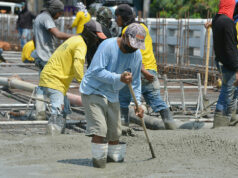House panel approves P1.5 trillion stimulus substitute bill
By Genshen L. Espedido
THE House of Representatives’ Defeat COVID-19 Committee on Thursday approved a substitute measure to House Bill 6709 which calls for a P1.5-trillion spending program over three years to address slowing economic growth and create jobs.
Also known as the proposed COVID-19 Unemployment Reduction Economic Stimulus (CURES) Act of 2020, the measure targets increased spending on readily-implementable health, education, agriculture, local roads and livelihood spending items.
The proposed law will support the construction of barangay health centers, municipal and city hospitals, digital equipment for testing, “tele-health” services and e-prescription systems, post-harvest facilities, and food depots, among others.
Other eligible infrastructure projects include walking or bicycle lanes; bridges across creeks and irrigation canals; evacuation centers and disaster emergency facilities; and roads going to tourist sites, beaches, mountain parks, new business districts or economic zones, and hubs for small and medium-sized enterprises.
Also qualifying for funding are farm-to-market roads, roads connecting communities to schools and health facilities; the Enhanced Sustainable Livelihood Program of the Department of Social Welfare and Development (DSWD), the Enhanced TUPAD Program and Barangay Emergency Employment Program of the Department of Labor and Employment (DoLE), and access to credit and financing for micro, small and medium-scale enterprises.
An initial P500 billion of the CURES Fund will be released in the first year of the 2020–2022 economic stimulus period and employment program, with P500 billion more for release in the second year, and the remaining P500 billion in the third year.
After the third year of the program’s implementation, the bill allows for Congress to enact legislation either extending or terminating CURES. Post-termination, surplus funds will be placed at the disposal of the following year’s national budget.
Infrastructure projects will be undertaken “in conjunction” with the Balik Probinsya, Bagong Pag-Asa program, which was authorized by President Rodrigo R. Duterte via Executive Order (EO) No. 114, with the objective of decongesting Metro Manila.
“We seek to end the unemployment problem through massive investment on public infrastructure, which we describe as shovel-ready projects. This strategy, at the same time, aims to provide a solid impetus to the government’s Balik-Probinsya program by creating jobs in the countryside,” House Majority Leader and Leyte Representative Ferdinand Martin G. Romualdez said in a statement Thursday.
The committee also approved the substitute measure to House Bill 6623 or the Better Normal for the Workplace, Communities, and Public Spaces Act of 2020, which requires social distancing and the use of face masks in public under the so-called new normal.
Under the bill, gatherings and the flow of people in public markets, parks and plazas will be “highly regulated.”
The operation of motorcycle taxis will remain suspended to prevent the spread of the virus through shared helmets and close physical contact between the rider and passengers.
The bill also seeks to suspend classes and other school activities until further notice “without prejudice to the academic freedom and levels of autonomy of institutions of higher learning,” provided that no student is unreasonably penalized for their inability to participate in online learning.
Restaurants may reopen with take-out and delivery service only, while malls and other commercial establishments must limit the number of people inside their premises and enforce contact-less sales and customer service.
A substitute measure to House Bill 6707 which seeks baseline COVID-19 testing for the vulnerable members of society was also approved by the panel.
The measure requires the Philippine Health Insurance Corp. (PhilHealth) to shoulder the cost of testing for vulnerable members of society who shall undergo baseline testing to detect COVID-19 infection.
All three bills are awaiting second reading at the chamber.



